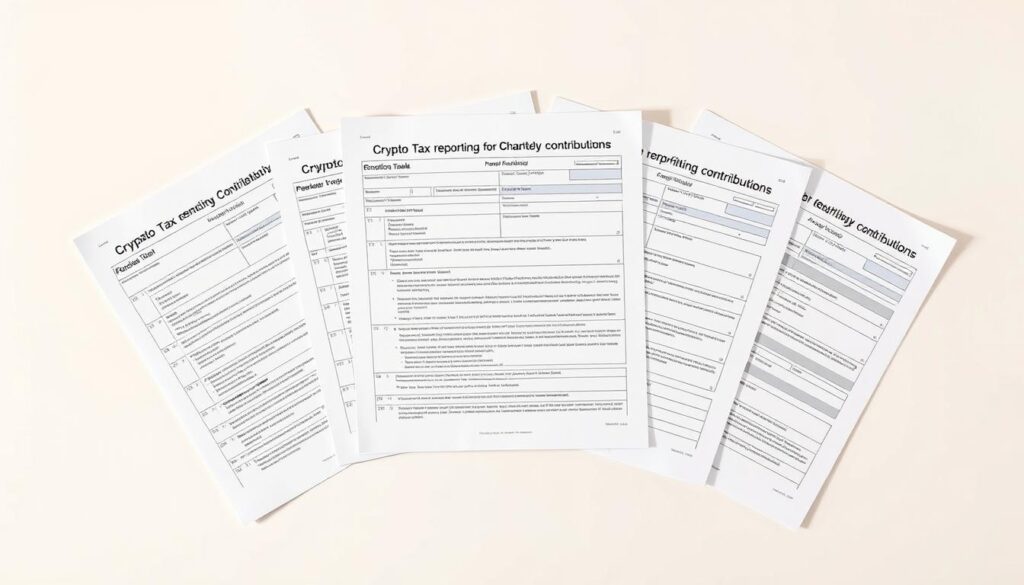When you donate cryptocurrencies, you need to follow IRS rules to get tax deductions. This is important as more people use digital assets. You must keep track of your donations and make sure the charities are eligible.
Getting your crypto tax reporting right is key to avoiding penalties. You should keep records of when you donated, what you donated, and its value. This way, you can get the tax benefits you deserve.
Key Takeaways
- Reporting crypto donations correctly is essential for valid cryptocurrency tax deductions.
- IRS guidelines require precise documentation of crypto donations to qualify for tax benefits.
- Donors can reduce tax liabilities through strategic crypto charitable giving.
- Qualified charities and proper valuation methods ensure compliance with crypto tax reporting rules.
- Consulting tax professionals helps navigate complexities in crypto charitable contributions.
Understanding Cryptocurrency Donations for Tax Purposes
Crypto donations have rules for tax purposes. You need to know what makes a donation valid. Here’s how to follow IRS guidelines for tax deductions:
What Qualifies as a Cryptocurrency Charitable Donation
A donation must go directly to a qualified charity. It must be given without the chance to get it back. Only direct gifts are accepted; trades for goods or services are not.
The IRS sees these trades as taxable, not donations.
Types of Crypto Assets Eligible for Donation
- Bitcoin (BTC) and Ethereum (ETH) are fully accepted.
- Other altcoins and utility tokens qualify if they meet IRS property classification.
- Stablecoins tied to USD or other currencies are eligible.
Qualifying Charitable Organizations for Crypto Donations
Only 501(c)(3) organizations qualify under IRS rules. Examples include United Way, Red Cross, or Fidelity Charitable. Schools, churches, and government entities also qualify.
Avoid non-U.S. charities unless they have IRS-recognized tax-exempt status.
The Tax Benefits of Donating Cryptocurrency
Donating cryptocurrency to qualified charities offers big tax perks. You can deduct the full fair market value of crypto at donation time. This way, you avoid capital gains taxes, saving money right away.
Crypto charitable contributions tax deductions depend on how long you’ve held the asset:
- Long-term holdings (over a year) qualify for deductions based on current value, not purchase price.
- Short-term crypto (held under a year) still allows deductions at original cost, avoiding potential capital gains liability.
Let’s say you donated Bitcoin bought for $10,000 now worth $50,000. You’d deduct the full $50,000. This saves you $8,000 in long-term capital gains tax on the $40,000 gain. Cash donations only deduct the original $10,000, making crypto gifts more effective.
Donating depreciated crypto can also be smart. Even if the value drops, you can still deduct it at its original cost. This approach fits into a bigger tax planning strategy, boosting both your charitable giving and financial savings.
How Current IRS Guidelines Affect Crypto Donations
The IRS views cryptocurrency as property, which changes how donations are handled. This impacts how donations are reported and taxed. It affects everything from how much something is worth to what paperwork is needed, guiding the crypto donations tax treatment for those filing taxes.
IRS Classification of Cryptocurrency
Crypto assets are taxed like property, not money. This means:
- Donors must track the cost basis and fair market value at the time of donation
- Capital gains taxes apply if the crypto’s value increased since it was bought
- Documentation must meet IRS Form 8283 requirements
RecentIRS guidelines for crypto donationsmake it clear that only donations to 501(c)(3) organizations qualify for deductions.
Recent Updates to Crypto Donation Regulations
In 2023, the IRS updated Publication 523 to include crypto donation details. Key changes include:
- Explicit rules for valuing non-cash crypto gifts
- Expanded reporting requirements for donations over $250
- Penalties for misreporting transaction dates or values
Taxpayers must checkIRS guidelines for crypto donationsevery year to stay in line.
Federal vs. State Tax Considerations
Federal rules require crypto donations to be reported at fair market value. State-level rules vary, including:
- Some states reject cryptocurrency as acceptable payment for taxes
- Different state deduction caps compared to federal limits
- Varied requirements for digital asset appraisal documentation
Check local tax codes to make surecrypto donations tax treatmentmatches state rules.
Determining the Fair Market Value of Your Crypto Donations
Getting the value right is crucial for tax compliance and getting the most deductions. Here’s how to follow the rules and avoid mistakes.
Valuation Methods Accepted by the IRS
The IRS has three main ways to value crypto donations:
- Mid-market price from reputable exchanges like Coinbase or Binance
- Timestamped transaction data showing exact donation time
- Third-party appraisals for niche or illiquid tokens
For big coins like Bitcoin or Ethereum, use prices from active trading sites.
Documentation Requirements for Valuation
Keep these records to back up your claims:
- Exchange trade confirmations showing pre-donation balances
- Blockchain transaction IDs proving transfer completion
- Written acknowledgments from charities
IRS audits often check donation timing and asset liquidity. Having detailed records helps avoid issues.
Timing Considerations for Optimal Valuation
Donate when crypto values are high in the tax year. Market volatility can help you get better values while meeting IRS deadlines. Use crypto tracking tools to plan your donations well.
Keep records of price changes with screenshots or certified charts. This meets the cryptocurrency tax reporting needs.
Required Documentation for Crypto Charitable Contributions
Proper cryptocurrency tax reporting requirements need detailed documentation for crypto donations. Charitable contributions of crypto need specific paperwork to avoid IRS scrutiny. All records must meet crypto tax reporting for charitable contributions standards for accurate deductions.
Keep detailed records for every donation. Charities must give a written acknowledgment by the tax-filing deadline. This letter must include the charity’s name, donation date, crypto type, fair market value, and a statement confirming no goods/services were received.
- Acquisition date and cost basis of donated crypto must be tracked to prove holding period for long-term capital gains treatment.
- Blockchain transaction details, including wallet addresses and transaction IDs, serve as proof of transfer.
- Keep screenshots of donation confirmations and IRS Form 8283 if donations exceed $500.
Not documenting acquisition details may lead to capital gains taxes on pre-donation price increases. Disorganized records risk deductions being rejected entirely. Use cloud-based spreadsheets or crypto tracking tools to log transactions consistently throughout the year.
IRS audits closely examine crypto donations. Organize documents chronologically and cross-reference with donation dates to avoid discrepancies. Digital backups and physical copies ensure compliance with federal tax guidelines.
Crypto Tax Reporting for Charitable Contributions: Step-by-Step Process
Proper crypto tax reporting for charitable contributions ensures compliance and maximizes tax deductions. Follow these steps to document donations correctly:

Reporting on Form 8283 (Noncash Charitable Contributions)
Noncash gifts over $500 need Form 8283. For crypto, list the asset type, its value at donation time, and if the charity sold it. Section B is for the cryptocurrency’s details, like name, quantity, and valuation date. Leaving out this info can lead to IRS trouble.
Schedule A Reporting Requirements
Crypto charitable contributions tax deductions go on Schedule A. List the total value under “Gifts to Charity.” Remember, donations count toward the 30% AGI limit for appreciated assets. Unlike cash, crypto gifts avoid capital gains taxes but need exact valuation proof.
Additional Forms for Large Donations
Gifts over $5,000 or nonpublicly traded assets need Section B of Form 8283 and a qualified appraisal. Large donations might also need Form 8949 if the charity sells the crypto. Always keep records of transactions, showing purchase price, sale proceeds, and donation dates.
Special Considerations for Donations Over $5,000
Donations over $5,000 need special handling under crypto donations tax rules. You must document everything properly to follow cryptocurrency tax reporting requirements. This ensures you get the most tax benefits. Not following these steps can result in penalties or losing deductions.
Qualified Appraisal Requirements
Donations over $5,000 must have a qualified appraisal that meets IRS standards. The appraisal must:
- Describe the crypto asset type and blockchain details
- State the fair market value on the donation date
- List valuation methods used (e.g., exchange rates, volume analysis)
- Include the appraiser’s credentials and contact information
This appraisal must be with your tax return and done by the donation date. If it’s late, your deduction might be rejected.
Selecting a Qualified Appraiser
Look for appraisers certified by groups like the American Society of Appraisers (ASA) or digital asset specialists. Ask:
- “Do you handle cryptocurrency valuations regularly?”
- “Will the appraisal meet IRS Form 8283 requirements?”
Appraisers not certified might not meet IRS standards. This could lead to audit risks.
Plan for appraisal costs early and book evaluations before donation dates. Not following rules can wipe out tax benefits. Always check if an appraiser is qualified to avoid big mistakes.
Tax Deduction Limits for Crypto Charitable Giving
Crypto donations for charity have limits based on your adjusted gross income (AGI). The IRS lets you deduct up to 30% of your AGI for these donations. If you give more, you can carry it over for up to five years.
In 2020, there was a special rule. It let you deduct up to 100% of your AGI for cash and crypto gifts to certain nonprofits. But, this rule is no longer in effect. For donations over $5,000, you need a qualified appraisal to get the deduction.
- Donors giving crypto must track donations annually to avoid exceeding the 30% AGI threshold.
- Excess contributions can be rolled into future returns, helping maximize cryptocurrency tax deductions over time.
- Consult IRS Publication 526 for carryover rules and AGI calculation specifics.
When you itemize deductions, make sure crypto gifts fit your financial goals. For instance, if you have $100,000 AGI, you can deduct up to $30,000 in crypto gifts in one year. Any extra can be carried over using Form 8283. Always check if your charity is on the IRS’s approved list to get the deduction.
Using Donor-Advised Funds for Cryptocurrency Donations
Donor-advised funds (DAFs) are a smart way to give to charity with crypto. You can put in digital assets, get tax benefits right away, and give to charities whenever you want. This makes it easy to manage your crypto donations and save on taxes.

Benefits of DAFs for Crypto Donors
DAFs have big perks for crypto owners:
- Immediate tax deduction: Get a tax break when you put in crypto, even if you give later.
- Control and flexibility: Pick when and where to give, without selling your crypto first.
- Streamlined record-keeping: Keep track of all your donations and gifts in one place.
How to Establish and Use a Crypto-Friendly DAF
Here’s how to start a crypto-friendly DAF:
- Pick a provider like Fidelity Charitable or Vanguard Charitable that takes crypto.
- Send your crypto to the DAF. Many platforms will convert it to cash or keep it as you wish.
- Choose where to give through the DAF’s website, keeping control over your donations.
Reporting Requirements for DAF Contributions
When you donate crypto to a DAF, follow these tax rules:
- Record the crypto’s value at the time you donate for tax forms.
- Use Form 8283 if your donation is over $500, listing the asset and its value date.
- DAF providers give you IRS Form 5768, making it easier to report on Schedule A.
Common Mistakes to Avoid When Reporting Crypto Donations
When you report crypto donations, you must follow strict rules. Mistakes in crypto tax reporting can lead to big problems. Here are some common errors to steer clear of:
- Ignoring precise valuation rules: Always use the asset’s fair market value at donation time, not purchase price.
- Missing documentation: Keep transaction records, receipts, and confirmation emails from charities.
- Form inaccuracies: Errors on Form 8283, like wrong asset descriptions or missing signatures, void deductions.
- Timing oversights: Filing Form 8283 late or failing to meet appraisal deadlines for donations over $5,000 disqualifies deductions.
Getting crypto tax reporting wrong can lead to IRS penalties. For example, if you undervalue crypto, your deductions might be lower. But overvaluing it could get you in trouble for fraud. Charities need to confirm donations within 30 days to meet IRS rules.
Keeping accurate records is key to proper crypto tax reporting. Make sure to track donation dates, amounts, and who you gave to. Use crypto wallets that keep a record of transactions. If you’re unsure, talk to tax software or advisors who know about crypto’s special reporting rules.
Handling Crypto Donations of Appreciated vs. Depreciated Assets
Donating cryptocurrency can change the value of your assets. The tax rules for appreciated and depreciated coins are different. Understanding these rules helps you get the most tax benefits while following IRS guidelines.
Strategic Timing of Donations Based on Market Conditions
Crypto’s price swings make timing crucial. For appreciated assets, donating when their value is high can save you from capital gains taxes. You can deduct their current value without paying taxes on their growth.
On the other hand, if your crypto has lost value, selling it first might be smarter. This way, you can claim losses and then donate the cash. Keep an eye on market trends and holding periods to figure out the best time to donate.
Tax Implications of Donation Timing
Donating appreciated crypto directly has two big benefits:
- No capital gains tax on growth
- A deduction based on current fair market value
For depreciated crypto, selling first lets you claim a loss deduction. Then, donating cash avoids locking in losses. Here’s a comparison:
- Appreciated crypto: Donate directly to claim full value deduction
- Depreciated crypto: Sell to deduct losses, then donate cash for tax efficiency
Talking to a tax expert is wise, especially with complex portfolios. Always keep records of cost bases and dates to follow crypto donations tax rules. Smart timing helps you use tax benefits while supporting good causes.
Utilizing Tax Software for Crypto Donation Reporting
Managing crypto tax reporting for charitable contributions needs the right tools. Tax software like TurboTax and H&R Block can help with basic entries. But, for crypto-specific data, you need specialized solutions.
Platforms like CoinTracker, Koinly, and TaxBit are made for crypto. They handle donation valuations and form 8283 entries well.

Standard software might not handle crypto’s unique challenges. For example, tracking cost basis or calculating gains on donated coins is tricky. Only crypto-focused tools can handle these tasks.
Here’s how to pick the right tool:
- Simple donations: Use TurboTax or H&R Block for small, rare gifts.
- Complex holdings: Choose Koinly or CoinTracker for Form 8283 and FMV tracking.
- Large portfolios: TaxBit is best for high-volume donors, integrating with exchanges.
Steps to report crypto donations in software:
- Select “charitable contributions” in your tax tool.
- Input crypto type, quantity, and FMV on donation date.
- Attach screenshots or records showing transaction details.
Specialized software often connects with crypto wallets or exchanges. This reduces errors. For donors with many assets, automation ensures accuracy without manual IRS form filling. Compare features to find the best match for your donations and assets.
Working with Tax Professionals Who Understand Cryptocurrency
Understanding cryptocurrency tax deductions needs special knowledge of IRS rules for crypto donations. Not all tax experts know about crypto. So, picking the right advisor is key to avoid mistakes.
- Do you have experience calculating cryptocurrency tax deductions for donations?
- How do you verify compliance with IRS guidelines for crypto donations?
- Can you explain how crypto donation valuations align with IRS rules?
Seek specialized expertise in these situations:
- Donations over $5,000 needing Form 8283
- Holdings with complex transaction histories
- Non-fiat crypto assets like NFTs or stablecoins
Look for tax pros with CPA and CEFEX certifications. They know crypto. Expect to pay more for their services, from $500 to $3,000. Keep in touch all year, sharing your crypto and donation info fast. Working together well helps report crypto taxes right and follow IRS rules.
Planning Your Crypto Donation Strategy for Maximum Tax Benefits
When you give to charity with crypto, it’s smart to plan ahead. Start by checking your crypto portfolio to see which assets have grown a lot. Choose coins you’ve held for over a year to avoid taxes and get the most deduction.
- Start with assets that have grown a lot to lower your taxes and increase your deductions.
- Make donations in years when you earn more to offset your taxes better.
- Link donations to your estate plan to cut down on inheritance taxes and match your charitable goals with your legacy.
Match your crypto donations with your retirement plans. Use your highest earning years for bigger deductions, then adjust your portfolio later. Keep track of your donations with IRS-approved tools like TurboTax or CoinTracker. Check in with a crypto-savvy CPA every year to stay on track with market changes and new rules.
A good plan ties your crypto donations to your overall financial health. It balances saving on taxes now with giving to causes you care about. This way, every donation helps you and supports important missions.
Securing Your Financial Future While Supporting Causes You Care About
Using crypto for charity can help you reach your financial goals and support important causes. Knowing how crypto donations are taxed can help you save money while giving. The IRS treats crypto like property, so you can deduct its value at the time of donation.
New platforms make giving crypto to charity easier. They help you keep track of tax rules and make sure you follow them. Donating crypto when its value is high can save you money on taxes. This is explained in IRS Publication 526.
Even if you’re new to crypto donations, you can start with small amounts. Tax software can make reporting easier. More experienced donors might use donor-advised funds to increase their impact over time. Always check if charities accept crypto and get written receipts, as the IRS requires.
New trends like NFT donations and blockchain tools are changing how we give. These tools help track the impact of our donations. Keeping up with tax laws ensures your crypto donations help both your finances and the world.
FAQ
What qualifies as a cryptocurrency charitable donation for tax purposes?
A cryptocurrency donation is when you give digital assets to a qualified group, like a 501(c)(3) non-profit. The IRS sees these donations as noncash gifts. They must follow certain rules about how to document and value them.
What types of crypto assets are eligible for donation deductions?
Most cryptocurrencies, like Bitcoin and Ethereum, can be donated for tax breaks. But, the tax savings depend on how long you’ve owned the asset.
Are there special IRS guidelines for reporting crypto donations?
Yes, the IRS views cryptocurrencies as property. You must report their value at the time of donation on your taxes. Following IRS rules is key to getting your tax right.
What documentation is needed for cryptocurrency donations?
You’ll need a letter from the charity, records of when you bought the crypto, and its cost. Also, blockchain data helps prove the donation’s worth.
How can I determine the fair market value of my crypto donations?
The IRS lets you use a few ways to value your crypto. You can average the high and low prices on donation day from known exchanges. Accurate valuation is crucial for tax deductions.
What are the tax benefits of donating appreciated cryptocurrency?
Donating crypto you’ve held for a while can save you from capital gains taxes. You can also deduct the crypto’s value at donation time.
How do I report cryptocurrency donations on my tax return?
You must fill out Form 8283 for noncash donations. Include the deduction on Schedule A. You might need more forms for big donations.
What are the limits for tax deductions on cryptocurrency charitable contributions?
Deductions for crypto donations are capped at 30% of your adjusted gross income. If you give more, you can carry over the extra to later years.
What are donor-advised funds (DAFs), and how can they benefit crypto donors?
DAFs are accounts for giving to charity. You can donate assets, get a tax break, and make grants later. They’re great for managing your giving and taxes.
What mistakes should I avoid when reporting crypto donations?
Don’t mess up valuation, forget documentation, or skip qualified appraisals when needed. Also, don’t delay submitting forms. These errors can lead to lost deductions or audits.


No comments yet